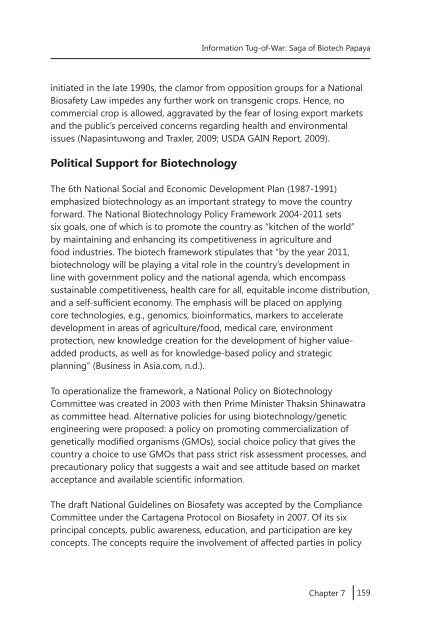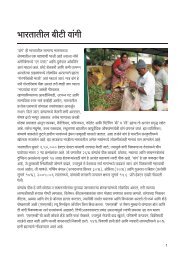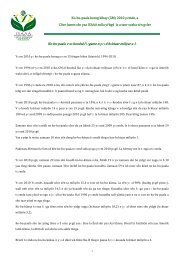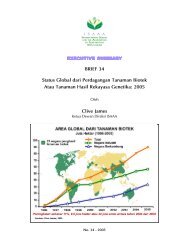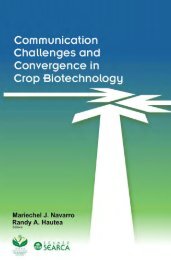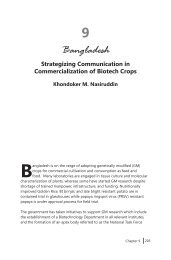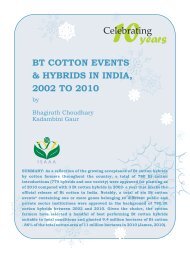Information Tug-of-War: Saga of Biotech Papaya 7 Agricultural - isaaa
Information Tug-of-War: Saga of Biotech Papaya 7 Agricultural - isaaa
Information Tug-of-War: Saga of Biotech Papaya 7 Agricultural - isaaa
You also want an ePaper? Increase the reach of your titles
YUMPU automatically turns print PDFs into web optimized ePapers that Google loves.
<strong>Information</strong> <strong>Tug</strong>-<strong>of</strong>-<strong>War</strong>: <strong>Saga</strong> <strong>of</strong> <strong>Biotech</strong> <strong>Papaya</strong><br />
initiated in the late 1990s, the clamor from opposition groups for a National<br />
Biosafety Law impedes any further work on transgenic crops. Hence, no<br />
commercial crop is allowed, aggravated by the fear <strong>of</strong> losing export markets<br />
and the public’s perceived concerns regarding health and environmental<br />
issues (Napasintuwong and Traxler, 2009; USDA GAIN Report, 2009).<br />
Political Support for <strong>Biotech</strong>nology<br />
The 6th National Social and Economic Development Plan (1987-1991)<br />
emphasized biotechnology as an important strategy to move the country<br />
forward. The National <strong>Biotech</strong>nology Policy Framework 2004-2011 sets<br />
six goals, one <strong>of</strong> which is to promote the country as “kitchen <strong>of</strong> the world”<br />
by maintaining and enhancing its competitiveness in agriculture and<br />
food industries. The biotech framework stipulates that “by the year 2011,<br />
biotechnology will be playing a vital role in the country’s development in<br />
line with government policy and the national agenda, which encompass<br />
sustainable competitiveness, health care for all, equitable income distribution,<br />
and a self-sufficient economy. The emphasis will be placed on applying<br />
core technologies, e.g., genomics, bioinformatics, markers to accelerate<br />
development in areas <strong>of</strong> agriculture/food, medical care, environment<br />
protection, new knowledge creation for the development <strong>of</strong> higher valueadded<br />
products, as well as for knowledge-based policy and strategic<br />
planning” (Business in Asia.com, n.d.).<br />
To operationalize the framework, a National Policy on <strong>Biotech</strong>nology<br />
Committee was created in 2003 with then Prime Minister Thaksin Shinawatra<br />
as committee head. Alternative policies for using biotechnology/genetic<br />
engineering were proposed: a policy on promoting commercialization <strong>of</strong><br />
genetically modified organisms (GMOs), social choice policy that gives the<br />
country a choice to use GMOs that pass strict risk assessment processes, and<br />
precautionary policy that suggests a wait and see attitude based on market<br />
acceptance and available scientific information.<br />
The draft National Guidelines on Biosafety was accepted by the Compliance<br />
Committee under the Cartagena Protocol on Biosafety in 2007. Of its six<br />
principal concepts, public awareness, education, and participation are key<br />
concepts. The concepts require the involvement <strong>of</strong> affected parties in policy<br />
Chapter 7 159


